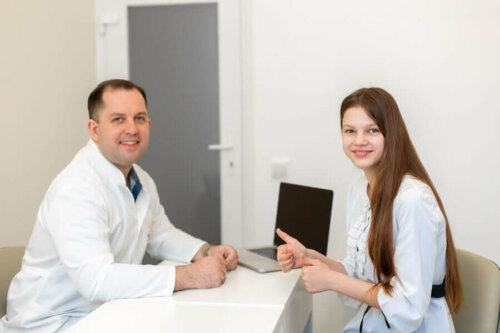Most Frequent Reasons Why Teenagers Visit a Doctor


Written and verified by Doctor Irene Nora Melamed
Identifying the most frequent reasons why teenagers visit a doctor is an essential step. Knowing the ailments they suffer, as well as the determining factors that cause them, should be the objective of researchers in this field.
Frequent reasons why teenagers visit a doctor
According to a publication by a group of researchers at the Hospital General Dr. Manuel Gea González in Mexico City:
“The number of teenagers in the national context isn’t that important. The societal challenge to guarantee the satisfaction of their needs and demands is. In addition, we must ensure the full development of their particular abilities so they reach their full potential.”
Medical consultations in teenagers between the ages of 10 and 14 years old are about pubertal development, abdominal pain, and headaches. It goes well beyond the particularities offered by the different contexts. Acne isn’t always a reason to consult a doctor but it’s part of their life.
Emotional factors also play an important role, although they’re not a frequent reason for consultation. However, experienced professionals can quickly identify mood swings even when it wasn’t the obvious reason for the consultation. Then, the challenge is to reveal any expressions and discomforts they may be concealing for different reasons.

Truths about teenage consultations
Many people assume teenagers are healthy and only consult doctors for minor issues, or for physical fitness checkups.
This is good because it allows them to be in touch with their doctor at least once a year. Also, they get to know about their immune status and the need for any new vaccines.
Even so, people associate teenage health with eating disorders, trauma, violence, and suicide, in recent times. The latter is particularly noteworthy, as the numbers are on the rise.
You may want to know How to Recognize Depression in Teenagers
Beliefs and perceptions about teenagers and their health
It’s difficult to eradicate some strongly ingrained beliefs that shape the image some people and the community at large have of adolescents.
There are myths about sex and rock and roll as well as a conceptualization of adolescence as the “divine measure of youth.” The truth is that young people are generally healthy and committed to their projects (if any), ideals, and purposes.
Returning to the subject of the reasons for frequent teenage consultation, the development of healthy sexuality is important. So, health professionals must continuously review these practices and try to clear any prejudices teenagers may have in this regard.
Pregnancy is one of the reasons why teenagers visit a doctor
Unplanned pregnancy in adolescence is a cause for concern. For instance, Argentina’s ministry of education implemented a specific project through a national program of integral sexual education (ESI).
Its objective is to work on the reduction of unintended pregnancy in teenagers and the fulfillment of sexual and reproductive rights. In fact, these are part of ESI’s curricular guidelines – at least according to data from that same program:
“Teenage pregnancy is usually a topic of conversation in the teaching and management of groups and families. Each person has their own view on the subject. Furthermore, there’s an exchange of impressions and ways of dealing with it; of ensuring the continuity of educational paths.”

Learn about Antisocial Behavior and Brain Structure
Additional questions about the reasons why teenagers visit a doctor
Many questions arise with regard to teenage pregnancy. Thus, the authors highlight and pose a series of questions in the education material we referred to above:
- What’s the best way to be there for them?
- How can schools contribute to the goal of preventing unwanted pregnancies?
- Also, what are schools currently doing?
- Do schools teach about contraceptive methods?
- Do they talk enough with teenagers, listen to their doubts, fears, and looks?
- Also, do they provide a space for genuine dialogue with them? What are the social representations regarding adolescent pregnancy?
- What’s the normative framework that covers this issue?
In short
Teenagers are healthy, in general, and many of their problems have to do with behavior.
Talking about these issues early in order to promote their health is an important way to prevent much-feared scenarios as depression, suicide, and violence.
All cited sources were thoroughly reviewed by our team to ensure their quality, reliability, currency, and validity. The bibliography of this article was considered reliable and of academic or scientific accuracy.
- Irma Jiménez-Escobar, Samuel Weingerz-Mehl, Elizabeth Castillo-Macedo et al. “Caracterización de los adolescentes y motivo de consulta por el que acuden al Servicio de Urgencias Pediátricas del Hospital General Dr. Manuel Gea González”. Gac Med Mex. 2016;152:30-5.
- Plan Nacional de Prevención del Embarazo no intencional en la adolescencia. “El embarazo no intencional en la adolescencia” Ministerio de Educación, Argentina.
- Wilkes MS, Anderson M. A primary care approach to adolescent health care. West J Med. 2000;172(3):177–182. doi:10.1136/ewjm.172.3.177
- McPherson A. Adolescents in primary care. BMJ. 2005;330(7489):465–467. doi:10.1136/bmj.330.7489.465
This text is provided for informational purposes only and does not replace consultation with a professional. If in doubt, consult your specialist.








